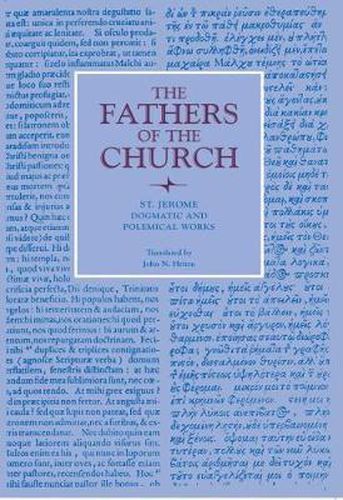Readings Newsletter
Become a Readings Member to make your shopping experience even easier.
Sign in or sign up for free!
You’re not far away from qualifying for FREE standard shipping within Australia
You’ve qualified for FREE standard shipping within Australia
The cart is loading…






St. Jerome’s reputation rests primarily on his achievements as a translator and as a scriptural exegete. The important service that he rendered to the Church in his doctrinal works is often overlooked or minimized by those who look for originality and independence of thought. St. Jerome was not a theologian in the strict sense of the word. He was no original thinker, and he never abandoned himself to personal meditation of dogma as St. Augustine did. Although he kept strictly to what he found in tradition, the importance of his doctrinal authority is not thereby lessened.
After spending twelve years of his early life at his native Stridon, he was sent to Rome in the year 359 to finish his literary studies. For the next eight years, from 359 to 367, St. Jerome studied very diligently grammar, the humanities, rhetoric, and dialectics. He also took a passionate interest in the Greek and Latin classics, in the philosophers and poets, and especially in the satirists and comic poets. These studies, it seems, tended not to soften, but to exaggerate the temperament of St. Jerome who was by nature irascible and impulsive, and sensitive to criticism and contradiction. The reading in the satirists and the comic poets developed in him a taste for caricature and a penchant for making damaging allusions. Moreover, the trials before the Roman tribunes, which he attended eagerly, and wherein the advocates indulged in mutual personal invective, further developed in him the art and science of polemics which he was to employ so effectively and skillfully in the controversies which were to engage his attention seriously.
St. Jerome stressed the fact that the Church must always be regarded as the supreme rule and decisive standard of the Christian faith; and that that Church gives the true sense of the Scriptures, and is representative of tradition. It was owing to this firm conviction on the part of St. Jerome that the years of his later life were consumed in endless conflicts with the enemies of the Church. St. Jerome never spared heretics, but always saw it that the enemies of the Church were his own enemies. His encounter with the Sabellians was St. Jerome’s first quarrel with an enemy of the Church. He gave notice early in his life that he would be a staunch protector of the doctrinal authority of the Church, and that he stood ready to attack any and all heresies that raised their heads against the Catholic faith.
$9.00 standard shipping within Australia
FREE standard shipping within Australia for orders over $100.00
Express & International shipping calculated at checkout
St. Jerome’s reputation rests primarily on his achievements as a translator and as a scriptural exegete. The important service that he rendered to the Church in his doctrinal works is often overlooked or minimized by those who look for originality and independence of thought. St. Jerome was not a theologian in the strict sense of the word. He was no original thinker, and he never abandoned himself to personal meditation of dogma as St. Augustine did. Although he kept strictly to what he found in tradition, the importance of his doctrinal authority is not thereby lessened.
After spending twelve years of his early life at his native Stridon, he was sent to Rome in the year 359 to finish his literary studies. For the next eight years, from 359 to 367, St. Jerome studied very diligently grammar, the humanities, rhetoric, and dialectics. He also took a passionate interest in the Greek and Latin classics, in the philosophers and poets, and especially in the satirists and comic poets. These studies, it seems, tended not to soften, but to exaggerate the temperament of St. Jerome who was by nature irascible and impulsive, and sensitive to criticism and contradiction. The reading in the satirists and the comic poets developed in him a taste for caricature and a penchant for making damaging allusions. Moreover, the trials before the Roman tribunes, which he attended eagerly, and wherein the advocates indulged in mutual personal invective, further developed in him the art and science of polemics which he was to employ so effectively and skillfully in the controversies which were to engage his attention seriously.
St. Jerome stressed the fact that the Church must always be regarded as the supreme rule and decisive standard of the Christian faith; and that that Church gives the true sense of the Scriptures, and is representative of tradition. It was owing to this firm conviction on the part of St. Jerome that the years of his later life were consumed in endless conflicts with the enemies of the Church. St. Jerome never spared heretics, but always saw it that the enemies of the Church were his own enemies. His encounter with the Sabellians was St. Jerome’s first quarrel with an enemy of the Church. He gave notice early in his life that he would be a staunch protector of the doctrinal authority of the Church, and that he stood ready to attack any and all heresies that raised their heads against the Catholic faith.